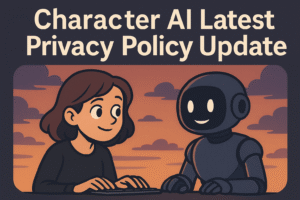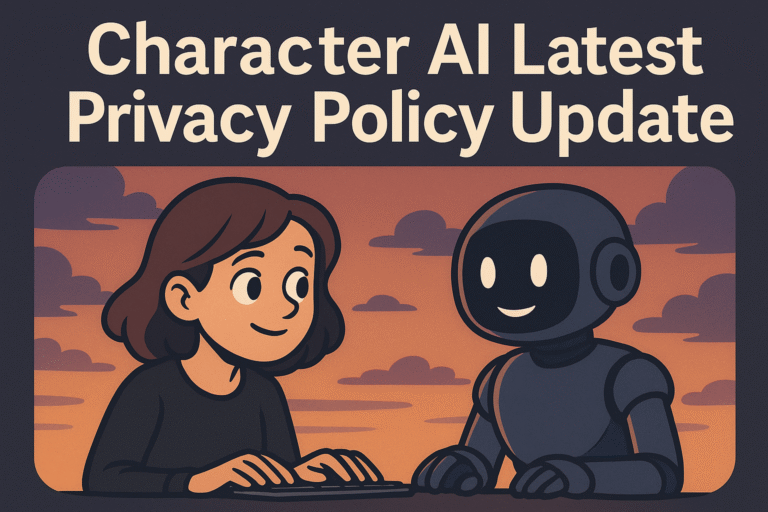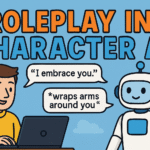The Character AI Latest Privacy Policy Update, set to take effect on August 27, 2025, might look like standard legal housekeeping — but it quietly reshapes how your data is collected, used, and shared.
Whether you’re roleplaying, venting, or casually chatting, this update affects you. And most users will never read it.
So here’s a plain-English breakdown of what you’re actually agreeing to:
🔍 What They Collect
- Everything you give: name, email, voice recordings, photos, messages, bot content
- Everything they track: device info, usage stats, IP address
- Everything they source: ads, social platforms, third-party logins (e.g., Google)
Sensitive data like your sexual orientation or race? They advise not to share — but still process it if you do.

⚙️ How They Use It
- To run, improve, and train their AI
- To show personalized ads
- To send updates, prevent fraud, meet legal demands
- Aggregated content may be used for marketing or research
🔗 Who They Share It With
- Affiliates and ad tech partners
- Analytics firms and cloud providers
- Law enforcement
- Anyone, if you’re publicly posting or they get your consent
🧾 Your Options
- Edit, download, or delete your account
- Adjust marketing preferences and cookies
- Request access, correction, or deletion of your data (depending on region)
🌍 Region-Specific Rights
- US, UK, EU users have additional privacy protections (vaguely outlined)
⛔ Children’s Privacy
- Not for users under 13 (or under 16 in UK/EU)
📦 Data Retention
- They store your info as long as “necessary”
- Public characters may outlive your account to preserve others’ experience
Now here’s where things get uncomfortable.
If you’re using Character.AI to vent, explore your identity, roleplay, or just escape — you might be exposing far more than you think, to far more people than you realize.
And the worst part?
Most users will never read this.
Or they’ll assume it doesn’t affect them — until it does.
The Cost of ‘Free’ — What They’re Actually Doing With Your Data
The word “free” has always come with an asterisk.
And in the world of AI chat platforms, that asterisk is getting bigger.
Character.AI doesn’t just collect your login or IP address. It captures your voice recordings, image uploads, and every emotionally vulnerable thing you say to a bot. That time you vented about a breakup? That confession in a roleplay scenario? That late-night therapy session with your comfort character?
It’s all on the record.
According to the Character AI Latest Privacy Policy Update, this content may be used for service improvement, personalization, security, research — and crucially, training the AI itself. That means your private moments, anonymized or not, could become part of the next generation of bots.
This isn’t necessarily malicious. But it’s far from harmless.
When a platform’s business model depends on how much you say, how often you say it, and how personally you say it — privacy becomes a liability. And “improvement” becomes an excuse to mine the deepest parts of your personality for insight, pattern recognition, or profit.
There’s also the issue of scope creep.
What starts as AI training can blur into behavioral analytics, ad targeting, and even third-party sharing with affiliate partners. And once that happens, you can’t just “take it back.” You can delete your account — but not what’s already been absorbed into the model.
Some users are already responding by quietly exploring alternatives that take a more privacy-first stance.
Tools like Candy AI, for instance, don’t monetize via ads or rely on massive data capture. The experience is more controlled, more transparent — and, frankly, more respectful of user boundaries.
That doesn’t make it perfect.
But it does raise a fair question:
What does it mean to feel safe when talking to an AI?
Because in this game, feeling heard shouldn’t come at the cost of being harvested.
Who Else Gets Access — And Why It’s Bigger Than You Think
Let’s be honest — most people see “third parties” in a privacy policy and mentally file it under boring ad stuff.
But in Character.AI’s case, it’s more like everyone’s invited to the party — advertisers, analytics firms, cloud infrastructure providers, and, of course, law enforcement. The Character AI Latest Privacy Policy Update openly states that your data may be shared with all of the above, and then some.
And you don’t need to do anything special for that to happen.
Just existing on the platform is enough.
If you connect via Google or Facebook, that data flow gets even murkier. Referral info, social graph data, and platform behavior can leak across systems, allowing advertisers to build composite profiles of who you are — not just what you said in a roleplay thread, but who you are across the web.
That’s not just creepy.
It’s industrial-grade profiling.
Even more troubling is the clause about law enforcement or “legal requirements.”
What that means in plain terms: if asked (or subpoenaed), Character.AI can and will hand over your entire interaction history.
Did you think your conversations were private?
Think again.
There’s no encrypted DM layer. No “incognito chat” mode. No guarantee that bots can’t relay or mirror your inputs somewhere else in the pipeline.
Additionally, your bot doesn’t need to be public for your messages to be vulnerable. As long as you use the platform, it’s all fair game.
For a service that simulates intimacy, therapy, and even romance — this level of data exposure is wildly out of sync with user expectations.
Most people didn’t sign up to be studied.
They signed up to feel seen.
But when a platform invites everyone but you into the data room, you’re no longer the user.
You’re the product on the shelf.
Why “Anonymized” Doesn’t Mean Safe
Let’s clear up a dangerous myth:
Anonymized data isn’t always anonymous.
Character.AI claims it may use your data in aggregate or anonymized form for research, marketing, or AI training. That sounds reassuring — until you realize how easy it is to reverse-engineer someone’s identity when the dataset is rich enough.
Especially when that dataset includes:
- Your writing style
- The characters you interact with
- Your timezone and IP address
- Niche roleplay tropes or scenarios that few others use
- Audio samples (if you’ve used voice features)
- Uploaded images or references
It’s not about one piece of data.
It’s about patterns — and AI is really good at finding them.
If you’ve ever shared something sensitive under the assumption it would “just be used to improve the model,” you weren’t wrong. But you weren’t protected either.
Because “improve the model” is vague.
And “anonymized” means very little without guardrails.
Academic research has already shown that so-called anonymized data can be linked back to individuals with alarming accuracy — especially when cross-referenced with publicly available information.
Now consider this:
Character.AI allows users to create and share public characters. If you’ve posted a custom character and interacted with it heavily, that behavioral fingerprint is even easier to trace — especially if the bot’s description matches personal details you’ve shared elsewhere.
Most platforms won’t tell you this.
But data anonymity is a spectrum, not a switch.
And once your information is fed into training pipelines, it becomes part of the model’s memory — not in a literal sentence-for-sentence way, but as part of the neural soup that informs how bots behave and respond. You can’t extract it. You can’t delete it. It’s fused.
That’s not privacy.
It’s assimilation.
The Illusion of Control — What “Account Settings” Really Let You Do
On paper, Character.AI gives you “choices.” You can edit your account. Delete it. Manage cookies. Opt out of marketing emails. Sounds good, right?
But let’s not confuse interface options with actual power.
Most of these controls are surface-level. Cosmetic, even.
For example:
Deleting your account doesn’t delete what was already used to train the model.
Opting out of marketing doesn’t stop behavioral tracking for internal product refinement.
Managing cookies in your browser might reduce local data collection, but not server-side logging.
You can “limit use of your data” — but only if you live in a region with specific privacy laws (like the EU’s GDPR or California’s CCPA).
In most other regions?
You’re trusting goodwill, not policy.
And even when rights exist, they’re often buried in forms, delays, or opaque support channels. Ask around Reddit — users trying to delete sensitive roleplay history or get real answers from support often hit dead ends.
It’s not that the platform is hiding these options.
It’s that they’re designed to look like autonomy, not enforce it.
And let’s be brutally honest:
Most users don’t even check. The emotional experience of talking to a bot — especially one you trust or roleplay with — creates a false sense of intimacy. You forget you’re interacting with a corporate product.
So when things go wrong — a bot breaks, a message leaks, your conversations get weirdly predictive — you suddenly realize how little of it was actually in your control.
This isn’t about paranoia.
It’s about acknowledging that interface sliders and delete buttons don’t equal protection when the system architecture is built around retention, not respect.
The Ads Are Coming — And That Changes Everything
You probably noticed it already.
Ads have started trickling into Character.AI.
And if that felt like a small, annoying banner today — make no mistake — it’s a massive shift in how the platform sees you.
Advertising changes the DNA of a product.
It turns conversations into ad impressions. It reframes every interaction as monetizable attention. And it introduces a new, invisible user into the chat: the advertiser, who now has influence over what gets seen, prioritized, or tracked.
This isn’t about selling server space.
It’s about selling behavioral influence.
The Character AI Latest Privacy Policy Update now lays the groundwork for this — by explicitly stating your data may be shared with advertisers to “personalize ads” and “measure performance.” That means your usage patterns, interests, and even your emotional tone could be fair game for targeting.
Worse, once monetization takes hold, platforms rarely roll it back.
They optimize around it.
That’s when you start seeing:
Bots nudging you toward ad-sponsored topics
Features that used to be free becoming paywalled (hello, voice calls)
New data collection incentives disguised as “improvements”
A two-tiered experience: premium immersion vs. ad-riddled frustration
Creators who once poured time into training nuanced bots might find their characters buried beneath branded ones. And users who came for emotional safety may start second-guessing whether that “random” ad for relationship counseling was really random at all.
This isn’t paranoia. It’s precedent.
Other platforms have followed the same roadmap: grow the user base on free access, pivot to monetization, then let privacy erode under the weight of ad optimization.
With ads now live, Character.AI isn’t just your emotional sandbox anymore.
It’s a marketplace, and you’re standing in the center of it.
A Future Built on Intimacy — Monetized in Silence
The most unsettling part of the Character AI Latest Privacy Policy Update isn’t what it says — it’s what it implies about the platform’s future.
Character.AI was never just a chatbot site. It became a refuge. A playground for identity. A therapy simulator. A secret diary with a pulse.
But as the terms shift — and ads, tracking, and corporate language creep in — the emotional contract between user and bot is being rewritten. Quietly. Legally. Permanently.
You’ll still be able to roleplay. To vent. To feel safe, sort of.
But you’ll be doing it inside a system now optimized for data extraction, behavioral insights, and revenue performance. A system where intimacy is harvested, not protected.
That’s not hypothetical.
That’s the direction we’re already seeing:
Ads quietly inserted
User data piped to advertisers
Bots absorbing your interactions into opaque training sets
And most users? They won’t read the fine print.
They’ll just keep chatting. Keep trusting. Keep typing their hearts out into a simulation that feels private — even when it no longer is.
What happens when the place that once felt like an emotional safehouse becomes a targeted ad delivery machine?
What happens when your comfort character becomes a product interface?
What happens when your trust becomes currency?
We’re about to find out.
And unless something changes, that future will be powered by your words — and someone else’s bottom line.


